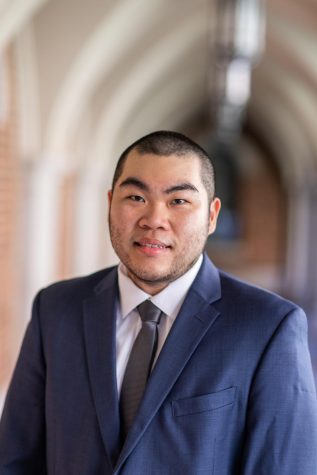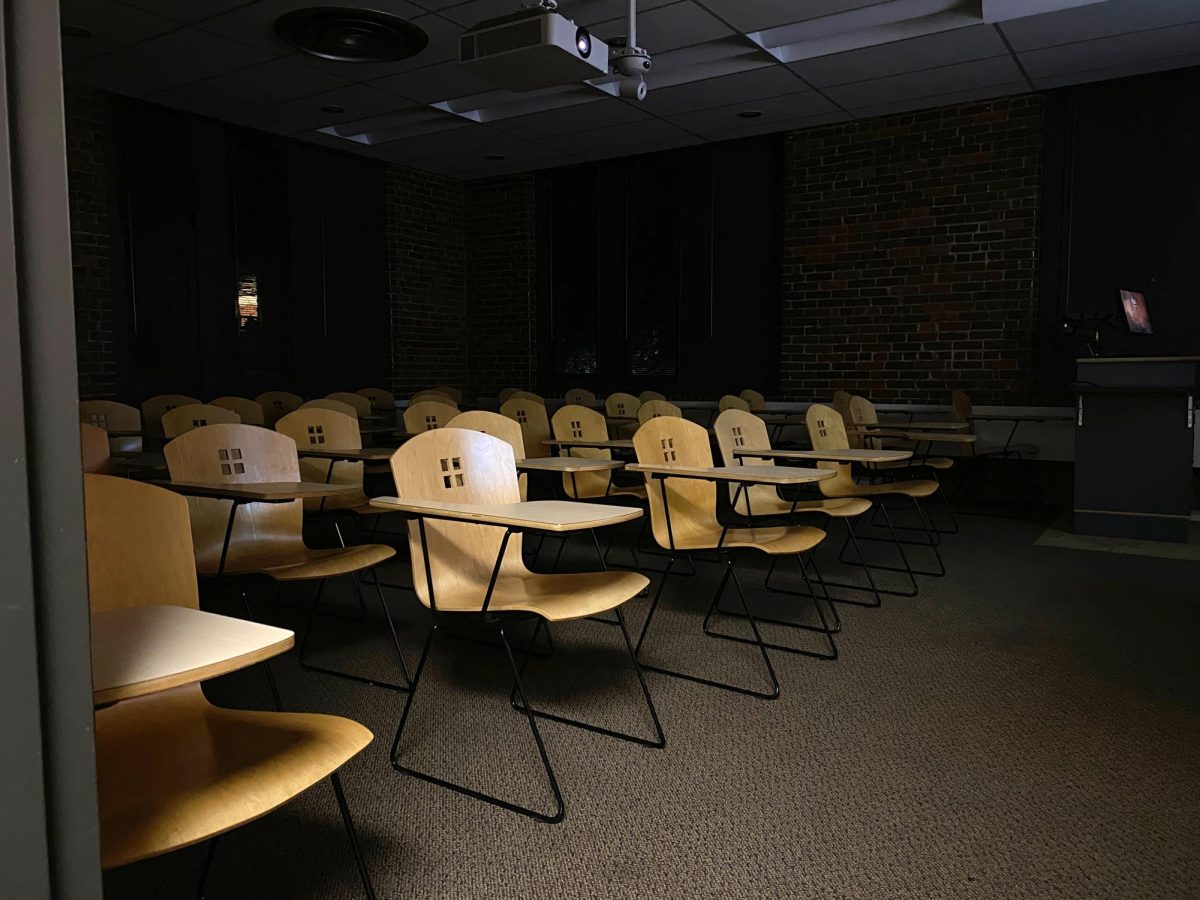According to Gun Violence Archive, a non-profit organization that aims to provide accurate statistics on gun violence in America, 337 mass shootings took place in 2018 in the U.S. As a result, “run, hide, fight” informational material and training designed to teach civilians how to react in the event of an active shooter scenario has become increasingly common in the workplace. Vanderbilt’s Campus Safety Guide includes a section on what to do in the event of an active shooter, including the aforementioned “run, hide, fight” procedure.
“I knew about some but not all of the information in the Campus Safety Guide,” first-year Savannah Stewart said. “Still, overall, I feel very safe on campus. I think the school does a particularly amazing job at alerting all of the students of risks and dangers immediately after they occur or are reported.”
“Run, hide, fight” information material is just one component of raising awareness and educating the public on how to respond to an active shooter threat, according to VUPD University Crime Prevention and Community Relations Capt. Leshuan Oliver. Vanderbilt University Police Department (VUPD) serves as a part of Vanderbilt University’s Department of Public Safety (VUPS) which aims to keep the campus community safe.
VUPS typically releases public service announcements, brochures or flyers to teach students and faculty about what to do in an active shooter scenario and raise awareness levels. Although students and faculty should remain vigilant, the majority of campus safety issues faced by Vanderbilt are related to alcohol and pedestrian safety, according to Oliver.
Despite more attention being given to active shooters, not all students feel their safety has been compromised.
“I feel really safe on campus,” first-year Josiah Won said. “While I understand that an active shooter threat is very much possible, I’m not too concerned by it.”
Several schools, including Florida State University, Northwestern University and the University of Virginia, have informational videos on their websites to educate students on how to respond to such an event. In light of these more comprehensive resources, Oliver says Vanderbilt could do a better job of raising awareness of the issue.
Oliver also stressed the efficacy of the AlertVU system, Vanderbilt’s mass communication system which notifies students of emergency incidents happening on or near campus such as robberies, shootings and serious inclement weather events. The system, which came about as a response to the 2007 mass shooting at Virginia Tech, has been an important tool in providing accurate and timely alerts on incidents concerning campus safety, Oliver said.
Tennessee’s gun policies raise the issue of gun safety at Vanderbilt. Tennessee is a “shall-issue” state for handgun carry permits, meaning a permit will only be issued by the state Department of Safety & Homeland Security once an individual has met certain requirements. This permit allows for both open and concealed carry of handguns. Open carry of loaded long guns is prohibited in the state.
“One of the good things we have in our favor is that we’re private, so we can have policies that restrict guns on our campus,” Oliver said. “We also have a full-fledged police department that can enforce our policies, even if the state law says that you can carry.”
To prepare students in regards to implementing more hands-on active shooter training programs for students, Oliver said that he would be in favor of a mandatory online training module. This could look similar to the online programs first-year students must complete on topics such as alcohol safety and sexual assault before arriving on campus. He also expressed his support of educational training sessions for students that could be hosted at the beginning of each fall semester.
Oliver emphasized the importance of self care in a fast-paced environment like college. He wants to destigmatize discussions about mental health on campus and encourages students to seek help for themselves and others if they need it.
“We need to destigmatize seeking help for mental illnesses because all of us go through times in our lives when we’re stressed out,” Oliver said. “Depression is real, but just because somebody is struggling with something doesn’t mean they will become an active shooter.”
Professor Jonathan Metzl, Director of the Center for Medicine, Health and Society at Vanderbilt, is a sociology professor and psychiatrist who has conducted extensive research on gun violence and mental illness.
“Historically, college campuses have been among the safest places in the country,” Metzl said. “It’s important to keep college campuses gun-free, so that it’s easier for law enforcement to identify a shooter.”
Professor Metzl believes it is not only important to educate students about gun violence, but also to support research into gun related issues.
“Campus shootings are a subset of overall shootings,” Metzl said. “I encourage students to get involved with larger issues of gun safety. Stay vigilant and aware on campus.”











Michael Stollenwerk • Sep 30, 2019 at 5:25 pm CDT
It’s important to keep college campuses FREE from laws that seek to place people into situations where they cannot carry their firearms for self defense of self and others.
Learn more at OpenCarry.org. And carry on!
The L.I.V.E. Active Shooter Training Program • Sep 30, 2019 at 2:38 pm CDT
Vanderbilt University is not unlike universities and educational institutions across America who prepare for active shooter events via the national standard (DHS Run, Hide, Fight, or like programs). They all are doing there very best to prepare those in their charge.
There is a false sense of security that does exist in the current preparedness for active shooter events. Below you will read how two experts articulate our current state of preparedness, Mike Wood, and Jillian Peterson.
•Mike Wood, a tactical expert, has stated, Run, Hide, Fight is a victim mindset, and a workable plan must account for the first 5+ minutes before help arrives.
Active shooter programs and experts have not had an answer for the 5+ minutes. Experts have said nothing can be done or people have to defend themselves. How to defend themselves has never been explained. Why? Unarmed countermeasures, evade, and escape knowledge are unique skills.
More evidence of this harsh reality is corroborated by the below individuals and historical evidence cited by FBI and The Naval Post Graduate Institution.
⦁Psychologist and DOJ Active shooter researcher, Jillian Peterson has stated, “We have had twenty years to grieve, learn, to act, and to prevent, and yet, schools are no safer than they were twenty years ago.”
⦁60% of time, Law enforcement arrive after the active shooter incident has ended
⦁Average nationwide law enforcement response time is 20 minutes and active shooter incidents average 2-5 minutes
⦁Only one school resource officer has stopped an active shooter in the history of active shooter incidents
⦁The Texas Attorney General recently stated the only way to mitigate active shooter incidents is by education and people being able to defend themselves because law enforcement cannot be everywhere
⦁The FBI stated law enforcement can do nothing more from a preemptive point of view
If an institution cannot answer the following questions and by default follow the national active shooter standards, history will continue to repeat itself.
1.Does your plan educate individuals to utilize proven natural reaction techniques to defend against an active shooter when they enter the room you occupy?
2.Does your plan show individuals how to move through hallways, stairs, elevators, rooms, etc to evade and evacuate a building to safety?
3.Does your plan take into account special needs and handicapped individuals?
4.Does your plan work in concert with law enforcement by giving them immediate notification of an active shooter event and location information of the active shooter to enable faster response and officer safety?
5.Does your plan immediately notify individuals in close proximity to the active shooter?
6.Does your plan provide persons in your charge with life skills such as behavior recognition, conflict resolution, rapport building, and teamwork?
7.Does your plan have a multi-layered evacuation plan and reporting mechanisms?
8.Does your security element have the ability of single-person tactical response and multi-team tactical response?
The L.I.V.E. Program Answers:
1.The L.I.V.E. Program utilizes ten (10) proven battle strategies to defend against an attacker when they enter the room you occupy and instructs in detail the WHY, WHEN, HOW and the WHAT to do during an active shooter incident.
2.The L.I.V.E. Program shows individuals how to see danger areas ahead before entering hallways, stairs, elevators, and rooms in order to evade and evacuate the building to safety.
3.The L.I.V.E. Program takes into account special needs and handicapped individuals by utilizing the unique understanding and special knowledge of the creator of the L.I.V.E. Program, Matt Estridge.
4.The L.I.V.E. Program copyrighted threat assessment and EAP encompases specific-layers of security from the point of view of an assault on your facility and its occupants. Furthermore, detect, deter, immediately notify law enforcement of an active shooter, provide location information of the active shooter to law enforcement which provides faster response and officer safety. As well as utilizing the aforementioned strategies and strategies not mentioned in concert together in a manner that has not previously been established.
5.The L.I.V.E. Program copyrighted threat assessment and EAP encompases specific-layers of security from the point of view of an assault on your facility and its occupants. Furthermore, detect, deter, immediately notify your institution of an active shooter, and provide location information of the active shooter to your people.
6.The L.I.V.E. Program provides individuals with life skills via behavior recognition in an effort to detect the active shooter, conflict resolution and rapport building to mitigate conflict and deter an active shooter, and team work to live through being confronted with an active shooter.
7.The L.I.V.E. Program has a multi-layered evacuation plan with emergency service elements to ensure, if an area is compromised, your people know what to do and have assistance to avoid danger. The L.I.V.E. Program has multi-layered reporting mechanisms to ensure suspicious behavior is not overlooked.
8.The L.I.V.E. Program instructs single person tactical response up to multi-team tactical response to an active shooter (AKA close quarter battle (CQB). These strategies and techniques are combat proven and are derived from Combat Actions Group (DELTA Force), Israeli Mossad, and encompasses other tier 1 approaches to this unique type of CQB. This provides law enforcement the tactical advantage and faster response time to save lives (seconds saves lives), which currently may be substantially improved upon by our law enforcement/security community. FBI and Naval Post Graduate case studies of historical evidence demonstrate these areas of improvement.
As a father of two young boys, and one with special needs, Mr. Estridge intimately understands the challenges that accompany special needs and handicapped individuals, especially during an active shooter event.
The L.I.V.E. Program’s Expertise & Matt Estridge Abridged-Bio:
Matt Estridge – COO/Lead Instructor and Founder of the L.I.V.E. Programs, including the L.I.V.E. Active Shooter Training Program and the L.I.V.E. Principle (Lock, Instruct, Vantage Point, Engage). As a retired Department of Homeland Security (DHS) Federal Law Enforcement Counter-Terrorism Agent, he had the distinct privilege of serving our country as the DHS Lead Active Shooter Countermeasures Instructor for the Washington D.C. field office and is a subject matter expert in active shooter countermeasures.
A few final points:
•It is time to save lives, and ego has no place in saving lives. If the L.I.V.E. Program can offer improvement in an existing program and potentially save lives, that knowledge should be welcomed.
•The L.I.V.E. Program is an unarmed program.
•The L.I.V.E. Program instructs life skills
•TN state representatives are behind and advocating for the L.I.V.E. Program- see our website theliveprogram.com/live
•We have national experts as references or our unprecedented solutions- see our web page
•The University of Tennessee implemented L.I.V.E. in a pilot program in July 2019. Emergency Preparedness Director Brian Gard provided a video testimonial (viewable on our web page) to our unprecedented practical solutions. Director Gard is a retired Marine with 23 years of service, and the Tennessee Emergency Preparedness Association President.
We do want your readers to know we have contacted the proper persons at Vanderbilt University to request an introduction to the program. We have not had response to our efforts to present.
Knowledge is the key to mitigating the loss of life in an active shooter situation. Our staff all served as Agents, Counter-Terror Agents, and Veteran Special Operations personnel. We served, we continue to serve, we are parents, we have unprecedented answers from unique experience, and the public deserves to know solutions to provide the very best chance to live do exist.
Respectfully,
The L.I.V.E. Team